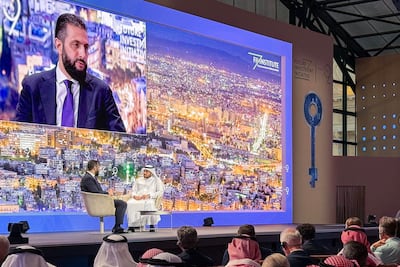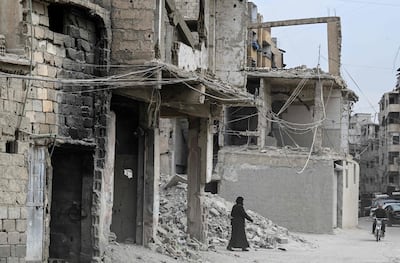Syria’s transitional government has vastly increased electricity prices, scrapping most subsidies on a public service that delivered barely more than an hour of power a day under Bashar al Assad.
The decision took effect on November 1, with bills reflecting the new rates expected to be issued in January, sources from the energy ministry told The National. The changes to previously nominal fees were necessary, ministry spokesman Abed Al Hameed Al Salat said, owing to the electricity sector’s massive annual losses of “nearly a billion dollars”.
“The losses are big. The ministry was faced with two choices: the collapse of the entire energy sector or enacting a reform plan,” he said. “We're doing this to avoid the collapse of the sector.”
The decision to raise power tariffs is one of the most sweeping and sensitive economic decisions made by the new Syrian authorities since their takeover in December last year. It has already prompted small demonstrations across parts of the country, where 90 per cent of people live under the poverty line, according to UN estimates.
The average salary in Syria is about $60 a month, and the national currency, trading at 11,500 Syrian pounds to the dollar, has yet to recover from its wartime collapse.
Under Assad rule, electricity supply had declined to one or two hours of state power a day in government-held areas, due to severe infrastructure damage from years of war. The new authorities have since expanded supply to between eight and 10 hours a day to those areas, but officials said the sector would continue to bleed money unless tariffs are reformed.
Tiered system
Under the new system, people pay in two-month instalments, with prices divided into tiers.
The first tier, designed for low-income households, remains 60 per cent subsidised by the government, with a ceiling of 300 kilowatt hours. Households will now pay about 600 Syrian pounds ($0.052) per KWH – or about $15 every two months.
It is a dramatic increase from the previous rate of nine Syrian pounds per kilowatt hour, or a total of $0.27 per billing period.
Household that exceed the 300 kWh ceiling will pay the second-tier price of 1,400 pounds for every extra hour. A third and fourth tier are intended for public institutions and factories, which will be priced at about 1,700 to 1,800 pounds per KWH.
Energy ministry officials told The National the first tier was capped at 300 kilowatt hours to reflect the consumption of the average Syrian household.
“Three hundred kilowatts is more than enough for the average household. It's actually over the average,” Mr Al Salat said. “We conducted case studies in areas of Idlib and rural Aleppo which had already been receiving 24 hour electricity.”
Mr Al Salat was referring to Idlib and others parts of north-west Syria that were under rebels' control before their overthrow of Mr Assad and their subsequent sweep into power. Areas under their administration have continued to receive 24-hour electricity supplied by neighbouring Turkey.
As for other urban centres that continue to suffer from spotty electricity due to infrastructure damage, Mr Al Salat said: “They're getting around eight hours of electricity and they still have to deal with rolling blackouts.” As a result, until the electricity sector is able to provide 24-hour electricity to the rest of the country, “their consumption is not likely to be that high”.
But a mother of four in Damascus, Abir, told The National that her household consumed more than 600 KWH on average. “We'll wait to find out how much our next electricity bill will be,” she said. By her calculations, consuming 300 KWH above the subsidy cap will cost her household an additional $36 per billing cycle, on top of the subsidised maximum of $15.
Pro-government media reported small protests against the tariff rise in central Syria in the areas of Salamiyah as well as the industrial area of Hasia.
“The people want the downfall of the decision,” shouted dozens of people in front of a branch of the state electricity monopoly branch in Salamya, according to footage on social media.
Protesters held signs proclaiming that “My electricity bill is higher than my salary” and that “Electricity is a right, not a luxury”.
The new order under Hayat Tahrir Al Sham has made foreign investment in the infrastructure a priority, with Syrian President Ahmad Al Shara saying it would be preferable to international aid. Billions of dollars, mainly from Saudi and Qatari investors, were pledged into the power and other sectors. However, rebuilding has yet to begin 11 months after the downfall of the former regime.
As well as war damage, Syria's power sector was affected by a lack of investment for decades before the conflict. In the past three years before the outbreak of the Syrian revolt in 2011, the Assad government scrapped subsidies on diesel, contributing to higher electricity costs for farmers, as well as resentment against the regime.
Syria's economy underwent limited opening since Mr Al Assad inherited power from his father, Hafez Al Assad, in 2000, but the ruling family and its associates remained in control of whole sectors, such as telecoms, oil and government procurement. The former regime sought foreign investment in the energy sector, including a wind farm, as part of a privatisation drive but little actual money flowed in, partly because of the advent of the civil war.
In numbers: China in Dubai
The number of Chinese people living in Dubai: An estimated 200,000
Number of Chinese people in International City: Almost 50,000
Daily visitors to Dragon Mart in 2018/19: 120,000
Daily visitors to Dragon Mart in 2010: 20,000
Percentage increase in visitors in eight years: 500 per cent
COMPANY PROFILE
Name: Qyubic
Started: October 2023
Founder: Namrata Raina
Based: Dubai
Sector: E-commerce
Current number of staff: 10
Investment stage: Pre-seed
Initial investment: Undisclosed
BOSH!'s pantry essentials
Nutritional yeast
This is Firth's pick and an ingredient he says, "gives you an instant cheesy flavour". He advises making your own cream cheese with it or simply using it to whip up a mac and cheese or wholesome lasagne. It's available in organic and specialist grocery stores across the UAE.
Seeds
"We've got a big jar of mixed seeds in our kitchen," Theasby explains. "That's what you use to make a bolognese or pie or salad: just grab a handful of seeds and sprinkle them over the top. It's a really good way to make sure you're getting your omegas."
Umami flavours
"I could say soya sauce, but I'll say all umami-makers and have them in the same batch," says Firth. He suggests having items such as Marmite, balsamic vinegar and other general, dark, umami-tasting products in your cupboard "to make your bolognese a little bit more 'umptious'".
Onions and garlic
"If you've got them, you can cook basically anything from that base," says Theasby. "These ingredients are so prevalent in every world cuisine and if you've got them in your cupboard, then you know you've got the foundation of a really nice meal."
Your grain of choice
Whether rice, quinoa, pasta or buckwheat, Firth advises always having a stock of your favourite grains in the cupboard. "That you, you have an instant meal and all you have to do is just chuck a bit of veg in."
Mubadala World Tennis Championship 2018 schedule
Thursday December 27
Men's quarter-finals
Kevin Anderson v Hyeon Chung 4pm
Dominic Thiem v Karen Khachanov 6pm
Women's exhibition
Serena Williams v Venus Williams 8pm
Friday December 28
5th place play-off 3pm
Men's semi-finals
Rafael Nadal v Anderson/Chung 5pm
Novak Djokovic v Thiem/Khachanov 7pm
Saturday December 29
3rd place play-off 5pm
Men's final 7pm
Our Time Has Come
Alyssa Ayres, Oxford University Press
KILLING OF QASSEM SULEIMANI
Types of bank fraud
1) Phishing
Fraudsters send an unsolicited email that appears to be from a financial institution or online retailer. The hoax email requests that you provide sensitive information, often by clicking on to a link leading to a fake website.
2) Smishing
The SMS equivalent of phishing. Fraudsters falsify the telephone number through “text spoofing,” so that it appears to be a genuine text from the bank.
3) Vishing
The telephone equivalent of phishing and smishing. Fraudsters may pose as bank staff, police or government officials. They may persuade the consumer to transfer money or divulge personal information.
4) SIM swap
Fraudsters duplicate the SIM of your mobile number without your knowledge or authorisation, allowing them to conduct financial transactions with your bank.
5) Identity theft
Someone illegally obtains your confidential information, through various ways, such as theft of your wallet, bank and utility bill statements, computer intrusion and social networks.
6) Prize scams
Fraudsters claiming to be authorised representatives from well-known organisations (such as Etisalat, du, Dubai Shopping Festival, Expo2020, Lulu Hypermarket etc) contact victims to tell them they have won a cash prize and request them to share confidential banking details to transfer the prize money.
The specs
Engine: 5.2-litre V10
Power: 640hp at 8,000rpm
Torque: 565Nm at 6,500rpm
Transmission: 7-speed dual-clutch auto
Price: From Dh1 million
On sale: Q3 or Q4 2022
COMPANY%20PROFILE
%3Cp%3E%3Cstrong%3EName%3A%3C%2Fstrong%3E%20Floward%0D%3Cbr%3E%3Cstrong%3EBased%3A%20%3C%2Fstrong%3ERiyadh%2C%20Saudi%20Arabia%0D%3Cbr%3E%3Cstrong%3EFounders%3A%20%3C%2Fstrong%3EAbdulaziz%20Al%20Loughani%20and%20Mohamed%20Al%20Arifi%0D%3Cbr%3E%3Cstrong%3ESector%3A%20%3C%2Fstrong%3EE-commerce%0D%3Cbr%3E%3Cstrong%3ETotal%20funding%3A%20%3C%2Fstrong%3EAbout%20%24200%20million%0D%3Cbr%3E%3Cstrong%3EInvestors%3A%20%3C%2Fstrong%3EAljazira%20Capital%2C%20Rainwater%20Partners%2C%20STV%20and%20Impact46%0D%3Cbr%3E%3Cstrong%3ENumber%20of%20employees%3A%20%3C%2Fstrong%3E1%2C200%3C%2Fp%3E%0A
Read more from Johann Chacko
How Islam's view of posthumous transplant surgery changed
Transplants from the deceased have been carried out in hospitals across the globe for decades, but in some countries in the Middle East, including the UAE, the practise was banned until relatively recently.
Opinion has been divided as to whether organ donations from a deceased person is permissible in Islam.
The body is viewed as sacred, during and after death, thus prohibiting cremation and tattoos.
One school of thought viewed the removal of organs after death as equally impermissible.
That view has largely changed, and among scholars and indeed many in society, to be seen as permissible to save another life.
Abu Dhabi Sustainability Week
Match info:
Leicester City 1
Ghezzal (63')
Liverpool 2
Mane (10'), Firmino (45')
Company%20profile
%3Cp%3E%3Cstrong%3ECompany%20name%3A%3C%2Fstrong%3E%20Fasset%0D%3Cbr%3E%3Cstrong%3EStarted%3A%20%3C%2Fstrong%3E2019%0D%3Cbr%3E%3Cstrong%3EFounders%3A%3C%2Fstrong%3E%20Mohammad%20Raafi%20Hossain%2C%20Daniel%20Ahmed%0D%3Cbr%3E%3Cstrong%3EBased%3A%3C%2Fstrong%3E%20Dubai%0D%3Cbr%3E%3Cstrong%3ESector%3A%20%3C%2Fstrong%3EFinTech%0D%3Cbr%3E%3Cstrong%3EInitial%20investment%3A%3C%2Fstrong%3E%20%242.45%20million%0D%3Cbr%3E%3Cstrong%3ECurrent%20number%20of%20staff%3A%3C%2Fstrong%3E%2086%0D%3Cbr%3E%3Cstrong%3EInvestment%20stage%3A%3C%2Fstrong%3E%20Pre-series%20B%0D%3Cbr%3E%3Cstrong%3EInvestors%3A%3C%2Fstrong%3E%20Investcorp%2C%20Liberty%20City%20Ventures%2C%20Fatima%20Gobi%20Ventures%2C%20Primal%20Capital%2C%20Wealthwell%20Ventures%2C%20FHS%20Capital%2C%20VN2%20Capital%2C%20local%20family%20offices%3C%2Fp%3E%0A




